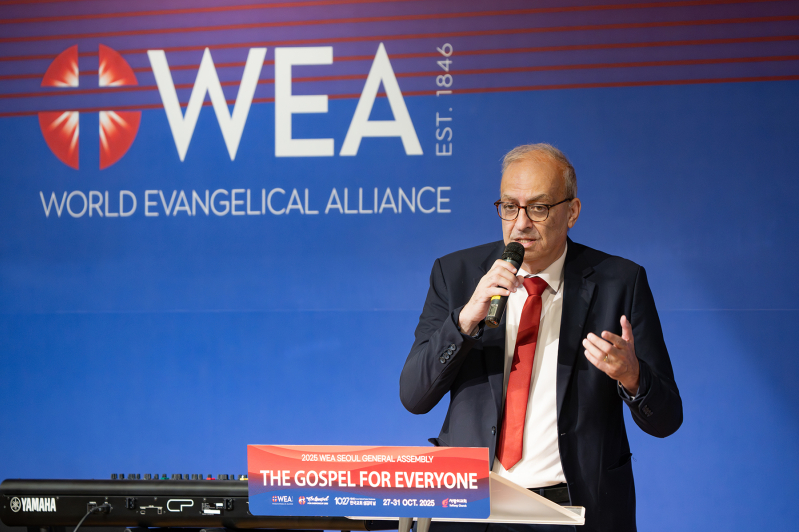
The World Evangelical Alliance Secretary General-designate Rev. Botrus Mansour urged Christians to celebrate their unity in Christ despite cultural, denominational, and personal differences, during the morning devotional on Thursday (Oct. 30) at the WEA General Assembly in Seoul, Korea.
Speaking on the final day of the weeklong gathering, Mansour drew from Ephesians 2 to remind delegates that believers are redeemed by grace, reconciled through Christ, and made one family and holy temple in which God dwells.
“Grace brings us all close to God — not just close, but even makes us one,” he said. “By his peace, we are now one body in the church because he broke the wall of hostility.”
Mansour opened with a humorous and personal story about staying in a luxury Chicago hotel gifted by a wealthy childhood friend. Though the room offered countless amenities, he and his wife avoided using most of them, unsure if they were included.
“As believers, we sometimes act like me and my wife in that luxury hotel,” he said. “We are in a place where we should enjoy and celebrate, but we fail to do so for different reasons.”
He likened that hesitation to how Christians sometimes live spiritually — redeemed yet hesitant to embrace the full joy and freedom of life in Christ.
Reflecting on the Apostle Paul’s message to the Ephesians, Mansour said Jesus “slain the enmity on the cross” and created a new humanity. Human divisions based on pride, nationality, or ideology, he said, must give way to the unity of the body of Christ.
“Through this emphasis on one value, we create hostility and enmity with others who do not possess it,” he said, referencing conflicts that arise from nationalism, religion, or even sports. “But Jesus has slain that enmity on the cross. Hallelujah.”
He gestured to the diverse assembly before him — evangelicals from over 130 nations — as a “microcosm of the heavenly feast” and a visible sign of reconciliation in Christ.
Mansour said Christian love is the active expression of unity: “Love is giving priority to the other in the pursuit of oneness.”
He explained that believers do not lose their unique identities but must be willing to lay them aside when they hinder fellowship. “My unique identity does not disappear, but my common Christian identity becomes the priority,” he said.
Quoting Jesus’ words in John 13, he added, “By this, all people will know that you are my disciples, if you have love one for another.”
Describing three layers of spiritual closeness from Ephesians 2:19–22, Mansour said believers are first “fellow citizens with the saints,” then “members of God’s household,” and finally “living stones” built together into a holy temple.
“Just imagine how tight that is and how close we should be to one another,” he said. “We have affection, respect, and we offer help. The blood of Jesus has brought us together as one family.”
He added that in the temple metaphor, “we are glued together like stones, and God dwells among us. Isn’t that a reason to rejoice?”
Mansour emphasized that Christian unity does not mean uniformity. Differences in personality, culture, and worship traditions, he said, are part of God’s design for the church.
“There is beauty in variety,” he said. “Monotony is boring. Diversity is glorious.”
He compared cultural expressions of celebration, from quiet reverence to joyful exuberance, and noted that “each one celebrates differently.” Even within evangelicalism, he said, there is a wide range of expressions — “some strict, some easygoing, some loud, some meditative” — yet all are God’s people.
“Don’t condemn someone else who is celebrating in a different way than yours,” he urged. “All are loved in His sight.”
Mansour cautioned evangelicals not to lose the communal dimension of faith. While salvation is personal, he said, “God’s plan for the church is as a community — to worship, to love one another, to encourage one another, to face difficulties and to celebrate together.”
He used the analogy of Middle Eastern and European weddings to illustrate cultural variation and the richness of shared joy. In his view, the church’s communal life should resemble a family feast, not an individual retreat.
“If God wanted us to deal with Him only as individuals,” he said, “He would have taken us directly to heaven after salvation. But He has a plan for His church as a community.”
Celebration, Mansour said, takes many forms — worship, prayer, communion, art, acts of service, or social engagement. “Some see it in caring for orphans, some in justice issues, others in providing clean water,” he said. “All these ways are products of the gospel.”
He cautioned against assuming one’s own form of celebration is the only valid one. “Do not assume it is only your way,” he said. “The forms of celebration are diverse.”
Mansour concluded by pointing to the example of Paul and Silas in prison, who “were praying and singing hymns to God” despite their chains.
“Let us sing hymns and pray in times of difficulty,” he said. “Let us celebrate what the Lord has done for us by being one church, despite our diversity.”
Click here for CDI's full reporting from the WEA General Assembly.






